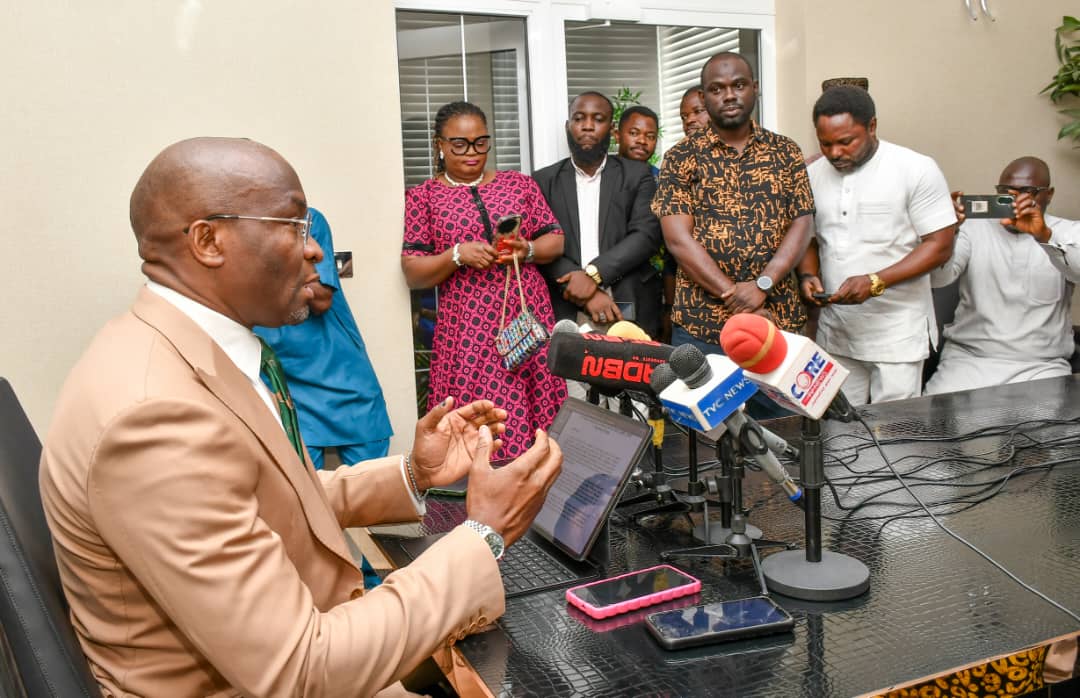1.1K
By Tracy Moses
The Deputy Speaker of the House of Representatives, Rt. Hon. Benjamin Kalu, has issued a strong call to the Joint Admissions and Matriculation Board (JAMB), urging the body to urgently commission a comprehensive, independent audit of its technical infrastructure in the wake of the devastating system glitch that marred the 2025 Unified Tertiary Matriculation Examination (UTME).
The 2025 UTME, marred by chaos and confusion, left a trail of disappointment as a massive technical error compromised the results of nearly 380,000 candidates, casting a shadow over one of Nigeria’s most critical educational gateways.
In a moment of rare vulnerability, JAMB Registrar, Prof. Ishaq Oloyede, broke down in tears last week, publicly accepting responsibility and pledging a resit opportunity for all affected candidates. But the apology, while commendable, may not be enough to heal the deep wounds inflicted by the blunder.
Speaking to journalists in Abuja on Sunday, Kalu said the “catastrophic events” that unfolded around the 2025 UTME have shaken public confidence in the integrity of Nigeria’s examination systems, threatening to derail the dreams of thousands of young Nigerians.
“Beyond apologies, what the Nigerian people deserve now is transparency, accountability, and reform,” Kalu said. “The trauma and uncertainty faced by candidates and their families cannot be undone by a simple ‘sorry.’ We owe them answers, and action.”
The Deputy Speaker expressed heartbreak over the tragic death of a candidate who reportedly took their own life following the results crisis, underscoring the gravity of the situation.
Revealing the outcome of an internal technical review available to him, Kalu disclosed that a critical system patch was never deployed to server clusters supporting 157 UTME centres in Lagos and the South-East, leaving these centres using outdated logic incapable of handling the new exam structure.
“In 2025, JAMB implemented three major changes,” Kalu said. “They moved from count-based to source-based result validation, shuffled questions and answer options more aggressively to curb malpractice, and introduced performance-optimizing system upgrades.”
While these innovations were bold and technologically promising, Kalu explained, the execution was fatally flawed.
“The system patch required to support these changes was fully installed in the Kaduna server cluster, but shockingly, the same patch was never deployed to the Lagos cluster, which services both Lagos and the South-East. This oversight remained uncorrected for 17 exam sessions,” he said.
The result? A massive failure cascade across 92 centres in the South-East and 65 in Lagos, affecting approximately 379,997 students, whose answer submissions were misinterpreted or invalidated due to server mismatches.
Kalu referenced findings from the Educare Technical Team, which independently analyzed data from 18,000 candidates. Over 14,000 of the authentic records reviewed came from the compromised regions, aligning with JAMB’s internal audit and confirming the systemic failure.
“This was not the fault of our students,” Kalu emphasized. “It was a grave institutional error, one that cost students their scores, their peace of mind, and in some cases, their will to go on. It’s a national tragedy.”
To prevent future occurrences, Kalu demanded that JAMB launch a fully independent, transparent system audit involving external experts in system engineering, cybersecurity, and educational testing.
He further called for an immediate review of all internal and third-party technical reports, especially those generated by private education technology firms that tracked candidate-level experiences.
“Only by comparing internal findings with external, independent evaluations can we ensure justice is served to every affected candidate,” he said.
Kalu also demanded that students in Lagos and the South-East, the hardest-hit regions, be given special consideration and protection, noting that they must not suffer further penalties due to institutional failings.
He called on JAMB to establish a public, accessible channel for remark and appeal, particularly for candidates dissatisfied with the resit process or those who encountered repeated technical issues.
In a final push for transparency, Kalu urged JAMB to release anonymised candidate-level data for independent verification and to open its systems to Freedom of Information (FOI) requests, emphasizing that credibility cannot be restored without public accountability.
“We must rebuild trust, our children deserve a future built on fairness, not failure.” Kalu concluded.



